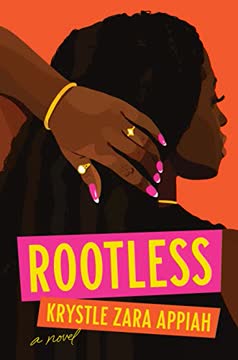Plot Summary
Vanishing Act
Sam returns home to find his wife, Efe, gone—her absence a gaping wound in their London flat. The evidence is subtle but devastating: missing shoes, empty hangers, a favorite necklace left behind. Panic surges as he scrambles to confirm their daughter Olivia is safe, but the truth settles in—Efe has left, and she's crossed continents to Ghana. Sam's world contracts to the routines of single parenthood and unanswered questions, his mind looping through memories, searching for the moment everything shifted. The pain of abandonment is raw, and the silence, voicemails, and missed connections between Sam and Efe grows louder with each passing day. The story's emotional core is set: a family fractured, love and loss tangled in the spaces left behind.
New Skies, Old Fears
Years earlier, Efe and her sister Serwaa arrive in London from Ghana, thrust into a world of cramped flats and unfamiliar customs. The city's sky feels closer, pressing down with the weight of newness and loss. School is a battleground of difference, where Efe's accent and skin mark her as other. She clings to her sister and the memory of home, but loneliness gnaws at her. The arrival of cousin Abbey offers a lifeline, introducing Efe to a wider world of friends and possibilities. Yet, beneath every new experience, the ache of displacement lingers, shaping Efe's sense of self and belonging.
Ties That Bind
Efe's world expands as she is drawn into Abbey's orbit, meeting Sam and Nate, who become central figures in her adolescence. The group's dynamic is electric—shared laughter, parties, and the thrill of first crushes. Sam and Efe's connection is tentative but deepening, their friendship a slow-burning foundation for something more. Through moments of joy and vulnerability, they navigate the complexities of growing up between cultures, balancing family expectations with personal desires. The bonds they form become both anchor and tether, shaping the choices that will define their futures.
Becoming Us
As the years pass, Efe and Sam's relationship evolves from platonic to romantic, marked by moments of tenderness and misunderstanding. University ambitions, family pressures, and the search for identity test their connection. Efe's academic struggles and eventual withdrawal from university leave her adrift, while Sam's steady progress toward a legal career offers stability. Their love is imperfect—complicated by secrets, self-doubt, and the scars of past trauma. Yet, in each other, they find solace and the hope of building a life together, even as the world around them shifts.
Cracks in the Foundation
Marriage brings new challenges: the weight of parental expectations, the realities of adulthood, and the unspoken wounds each carries. Efe's struggle with depression and self-harm resurfaces, her sense of failure compounded by cultural and familial pressures. Sam, driven by ambition and a desire to provide, becomes increasingly absent, his work consuming the time and energy needed at home. The birth of their daughter Olivia is both a blessing and a crucible, exposing the fault lines in their partnership. The couple's inability to communicate their needs and fears sets the stage for deeper fractures.
Dreams Deferred
Efe's transition into motherhood is fraught with anxiety, exhaustion, and isolation. The demands of caring for Olivia, coupled with the loss of her professional identity, leave her feeling invisible and unmoored. Attempts to return to work are met with resistance from Sam and her family, who view her ambitions as secondary to her role as mother. The relentless cycle of sleepless nights and self-doubt erodes her confidence, and the specter of postnatal depression looms. Efe's longing for autonomy and creative fulfillment clashes with the expectations placed upon her, deepening her sense of entrapment.
The Weight of Expectation
The couple's extended families exert powerful influence, their opinions shaping every major decision. Efe's parents, especially her mother Maame, are unyielding in their belief that motherhood and sacrifice are inseparable. Sam's family, too, is marked by absence and longing—his mother's abandonment a shadow over his own parenting. The couple's attempts to forge their own path are continually undermined by the weight of tradition, duty, and the fear of disappointing those they love. The struggle to balance personal happiness with communal obligation becomes a central tension, threatening to pull them apart.
Breaking Points
The cumulative strain of unspoken resentments and unmet needs reaches a breaking point. Efe, overwhelmed by the prospect of a second pregnancy and the memory of her first, makes the agonizing decision to terminate without Sam's knowledge. Her departure for Ghana is both flight and search for self—a desperate attempt to reclaim agency and peace. Sam, left behind, is consumed by anger and grief, his sense of betrayal compounded by the loss of the future he imagined. Both are forced to confront the limits of love and the consequences of choices made in silence.
Lost and Found
In Ghana, Efe reconnects with her roots, her sister, and old friends, seeking solace in art and the familiar rhythms of home. She grapples with guilt, shame, and the hope of forgiveness, both from herself and those she's hurt. Sam, meanwhile, is left to care for Olivia alone, navigating the challenges of single parenthood and the reemergence of his own mother. The distance between Sam and Efe is both physical and emotional, yet the possibility of reconciliation flickers—a fragile hope that healing is possible if they can find the courage to face the truth.
Motherhood Unraveled
Efe's time in Ghana becomes a period of transformation. Through painting and the support of her community, she begins to process her pain and rediscover her sense of self. Conversations with her mother and sister force her to confront the generational patterns of sacrifice and silence that have shaped her life. The realization that love and regret can coexist allows Efe to imagine a new way forward—one that honors her needs as well as her responsibilities. The journey toward self-acceptance is neither linear nor easy, but it is essential.
The Choice
Efe decides to return to London, determined to rebuild her life with Sam and Olivia on new terms. The couple's reunion is tentative, marked by honesty about past hurts and a shared commitment to doing better. They agree to split their time between Ghana and London, embracing the complexity of their identities and the realities of a transnational family. The process of forgiveness is ongoing, requiring vulnerability, patience, and the willingness to let go of old narratives. Together, they begin to imagine a future rooted in mutual respect and understanding.
Aftermaths
Just as hope seems within reach, tragedy strikes. Efe is killed in a car accident in Ghana, her life cut short before reconciliation can be fully realized. The shock reverberates through both families, leaving Sam and Olivia to navigate a world without her. The aftermath is a landscape of grief and memory, where the traces of Efe's presence linger in art, photographs, and the lives she touched. The process of mourning is communal and solitary, a testament to the enduring impact of love and loss.
Fractures and Forgiveness
In the wake of Efe's death, Sam and Olivia are surrounded by family and friends, each grappling with their own regrets and hopes for healing. The process of forgiveness extends beyond the couple, encompassing parents, siblings, and the wider community. Old wounds are acknowledged, and the possibility of new beginnings emerges. Through shared stories, rituals, and the simple act of showing up for one another, the family begins to stitch together a new narrative—one that honors the past while making space for the future.
Art as Salvation
Efe's art becomes a vessel for her story, a means of processing trauma and celebrating resilience. Her final exhibition in Ghana is both a culmination and a farewell, her paintings capturing the spectrum of her experiences—joy, sorrow, hope, and regret. For Sam and Olivia, the art she leaves behind is a tangible reminder of her spirit and the complexity of her journey. The creative process, for Efe and those who survive her, is a form of salvation—a way to make meaning from pain and to root themselves in the world anew.
Coming Home
In the months after Efe's death, Sam and Olivia return to Ghana, seeking connection with the family and culture that shaped Efe's life. The journey is bittersweet, marked by memories and the ache of absence. Yet, in the laughter of cousins, the taste of familiar foods, and the embrace of grandparents, they find a sense of home that transcends geography. The process of coming home is ongoing—a negotiation between past and present, loss and renewal.
The Last Goodbye
The family gathers to mourn and celebrate Efe's life, sharing stories, food, and the rituals of remembrance. Sam creates a living memorial, stringing photographs through the trees—a visual testament to the years they shared. The act of saying goodbye is both an ending and a beginning, a way to honor what was lost while making space for what remains. In the quiet moments of grief, love endures, shaping the contours of the lives left behind.
Roots and Remains
In the aftermath, Sam and Olivia learn to live with absence, carrying Efe's memory forward as they build a new life together. The lessons of the past—about love, sacrifice, forgiveness, and the importance of self—become the foundation for the future. The story ends not with closure, but with the recognition that roots can be both anchor and burden, and that the work of healing is never truly finished. In the laughter of children, the brushstrokes of a painting, and the quiet strength of those who remain, Efe's legacy endures.
Characters
Efe
Efe is the emotional heart of the story—a woman shaped by migration, cultural expectation, and the longing for autonomy. Her journey is marked by displacement, both literal and metaphorical, as she navigates the demands of family, marriage, and motherhood. Efe's relationship with Sam is foundational, but fraught with miscommunication and unmet needs. Her struggles with depression, self-harm, and the weight of generational sacrifice are rendered with raw honesty. Efe's development is a testament to the complexity of womanhood—her desire for creative fulfillment, her ambivalence about motherhood, and her ultimate quest for self-acceptance. Her choices, both brave and painful, ripple through the lives of those around her, leaving a legacy of love, regret, and resilience.
Sam
Sam is Efe's husband and Olivia's father, a man defined by his longing for stability and family. His childhood is marked by abandonment—his mother's departure a wound that shapes his approach to love and responsibility. Sam's ambition and work ethic are both strength and flaw, often blinding him to the emotional needs of those closest to him. His relationship with Efe is a source of joy and pain, their connection deep but tested by the pressures of adulthood. Sam's journey is one of learning to let go—of control, of resentment, of the belief that love alone can fix everything. In the aftermath of Efe's death, he is forced to redefine himself as a father and a man, finding meaning in the act of staying when others have left.
Olivia
Olivia is the couple's daughter, a bright and sensitive child whose presence anchors the narrative. Through her eyes, the complexities of family, loss, and belonging are rendered with clarity and poignancy. Olivia's development is shaped by the love and absence of her parents, her resilience a quiet testament to the possibility of healing. She is both a reminder of what was lost and a reason to keep moving forward, her laughter and curiosity infusing the story with light.
Maame
Efe's mother, Maame, is a formidable presence—unyielding in her beliefs about motherhood, sacrifice, and the proper order of things. Her love is fierce but often suffocating, her inability to see Efe's pain a source of deep conflict. Maame's own history of migration and struggle informs her worldview, and her desire to protect her daughters sometimes manifests as control. The rift between her and Efe is both generational and personal, a reflection of the broader tensions between tradition and autonomy. In the wake of tragedy, Maame is forced to confront her own regrets and the limits of her power.
Serwaa
Serwaa is Efe's younger sister, a source of support and occasional friction. More confident in her choices, Serwaa pursues her own path—marrying young, starting a family, and asserting her desires in the face of parental expectation. Her relationship with Efe is marked by both solidarity and difference, their bond tested by secrets and the divergent ways they navigate the world. Serwaa's pragmatism and warmth provide a counterpoint to Efe's restlessness, and her willingness to stand by her sister in moments of crisis is a testament to the enduring power of sibling love.
Abbey
Abbey is the cousin who introduces Efe to new worlds—of friendship, romance, and self-expression. Her confidence and charm are both inspiration and challenge, pushing Efe to step outside her comfort zone. Abbey's own journey is marked by ambition and the pursuit of artistic success, her relationship with Sam adding layers of complexity to the group's dynamic. She is both mirror and foil to Efe, embodying the possibilities and pitfalls of reinvention.
Ken
Sam's father, Ken, is a figure of stability and endurance. His life is marked by hard work, sacrifice, and the quiet pain of abandonment. Ken's relationship with his children is shaped by his own losses, and his efforts to provide a sense of home are both touching and fraught. His later years are marked by illness and vulnerability, forcing Sam and the family to confront the realities of aging and the limits of care.
Rebecca
Sam's mother, Rebecca, is a ghostly presence for much of the narrative—a figure whose absence shapes Sam's fears and desires. Her eventual return forces a reckoning with the past, as Sam grapples with the pain of abandonment and the possibility of forgiveness. Rebecca's own story is one of regret and the search for meaning, her choices echoing through the generations.
Nanadwoa
Nanadwoa is Efe's oldest friend in Ghana, a source of comfort and a reminder of the life left behind. Her own journey is marked by resilience in the face of scandal and disappointment, her choices reflecting the complexities of love, motherhood, and societal judgment. Nanadwoa's presence in Efe's life is a touchstone, grounding her in the realities of home and the enduring bonds of friendship.
Lawrence
Lawrence is the artist who encourages Efe to reclaim her creative voice, offering her a space to heal and experiment. His own story of loss and longing mirrors Efe's, and their friendship becomes a catalyst for transformation. Through art, Lawrence and Efe find a language for pain and hope, their connection a testament to the power of creation in the face of despair.
Plot Devices
Nonlinear Narrative and Dual Timelines
The novel employs a nonlinear structure, moving fluidly between past and present, London and Ghana, childhood and adulthood. This approach allows the reader to piece together the origins of the characters' wounds and desires, deepening empathy and understanding. The use of dual timelines—Efe's migration and coming-of-age, the unraveling of her marriage, and the aftermath of her disappearance—creates a sense of inevitability and suspense, as the reader is invited to search for the moments where everything changed.
Epistolary and Fragmented Communication
Communication—or the lack thereof—is a central motif. Voicemails, unanswered calls, and the gaps between what is said and unsaid drive the plot forward. The characters' inability to articulate their needs and fears is mirrored in the structure, with key revelations often arriving through indirect means—letters, overheard conversations, or the art Efe creates. This device underscores the theme of miscommunication and the longing for connection.
Symbolism of Art and Creation
Efe's journey as an artist is both literal and metaphorical. Her paintings become a means of processing trauma, expressing what cannot be spoken, and forging a new sense of self. The act of creation is depicted as both salvation and struggle, a way to root oneself in the world and to leave a legacy. The final exhibition serves as a narrative climax, bringing together the threads of memory, loss, and hope.
Foreshadowing and Circularity
The novel is rich with foreshadowing—early scenes of abandonment, cultural dislocation, and unspoken pain reverberate through later events. The circularity of experience—migration, motherhood, loss—creates a sense of fate, while also highlighting the possibility of breaking cycles through honesty and self-knowledge. The story's ending, with its return to Ghana and the gathering of family, brings the narrative full circle, suggesting that healing is found not in erasure, but in the embrace of complexity.
Analysis
Rootless is a profound meditation on the complexities of love, identity, and belonging in a world shaped by migration, generational expectation, and the search for self. Krystle Zara Appiah crafts a narrative that is both intimate and expansive, exploring the ways in which personal choices are entangled with cultural histories and familial legacies. The novel's strength lies in its refusal to offer easy answers—motherhood is depicted as both joy and burden, marriage as both sanctuary and crucible, and home as both anchor and exile. Through Efe and Sam's journey, the story interrogates the cost of silence, the necessity of vulnerability, and the possibility of forgiveness. The use of nonlinear storytelling, rich symbolism, and deeply drawn characters invites readers to reflect on their own roots and the ways in which we are all, in some sense, searching for a place to belong. Ultimately, Rootless is a testament to the enduring power of love—not as a panacea, but as a force that shapes, wounds, and, in the end, sustains us.
Last updated:
Review Summary
Rootless by Krystle Zara Appiah is a debut novel that has garnered mixed reviews. Many readers praise its compelling exploration of marriage, motherhood, and cultural expectations, while others criticize its pacing and character development. The book tackles sensitive topics like postpartum depression and abortion, eliciting strong emotional responses. Some readers found the ending disappointing or frustrating, while others were deeply moved. Overall, the novel is described as ambitious and thought-provoking, sparking discussions about gender roles, family, and personal identity.
Similar Books
Download PDF
Download EPUB
.epub digital book format is ideal for reading ebooks on phones, tablets, and e-readers.











